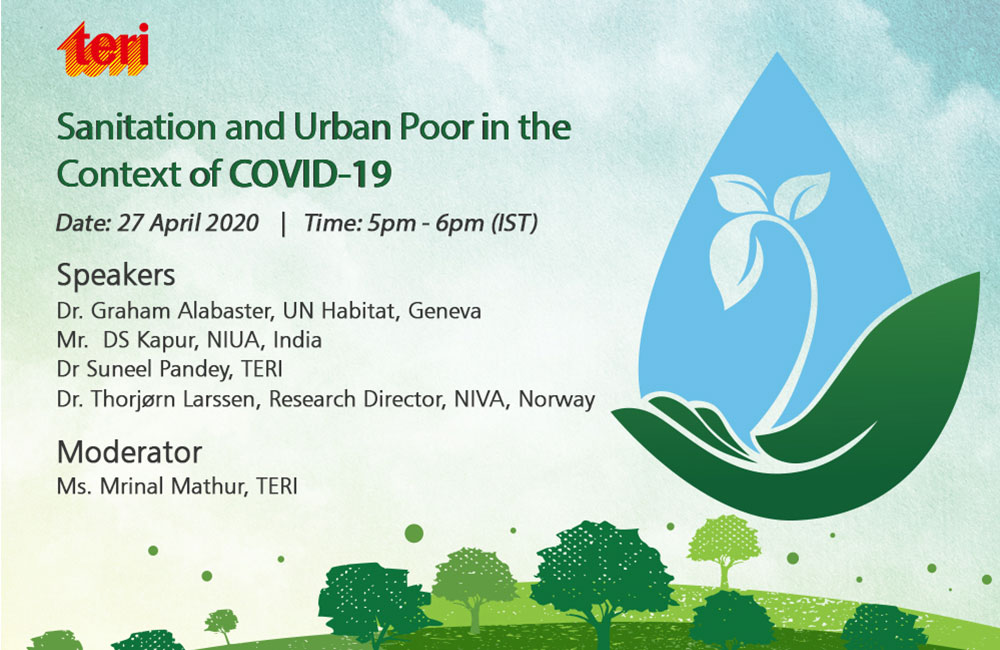Webinar on Sanitation and urban poor in the context of COVID-19
Objective
To envision a new world post COVID-19 in the context of urban sanitation and planning and define the priorities for action by the development community.
Background
A significant number of people live in low-income, highly dense urban areas in developing countries. Several issues need addressing to attain sanitation and good management of urban areas for poor. City planning, infrastructure development including public health services, water and sanitation services, communication with slum dwellers, conserving public and forest land will make cities livable in the future. Investment in cities on infrastructure that are equitable and oriented equitably to meet needs of city dwellers are needed. Now, with the sudden onset of COVID-19, the case of social distancing goes against the very fabric of planning in cities that neglect low-income areas and allow pandemics to flourish. Many modern day infrastructure and planning systems like sewage system originated from the plague of London and the great fire. COVID-19 is the current day pandemic that calls for strengthening sanitation systems and investing in city planning for poor. Today our urban areas are bereft of forests, wetlands, marshes that cleaned pollutants, protected drinking water supplies and species. As people clear wild lands for urbanisation, or eat wild animals, the diseases that these creatures carry can jump the species barrier and spill over into human societies. The ongoing coronavirus outbreak, for example, may have originated in bats.
Future planning of cities will be defined by better water supply, space, hygiene, public health systems and preserving nature to maintain the environment. Without an integration of these actions, managing sanitation may not be possible. This will require investments and a systemic change in policy and approach to planning, which may vary depending upon the context of the country. The future of sanitation and city planning leading figuratively and literally into a new decade and era post COVID-19 needs to be redefined.
On 27th April 2020, 17:00 hrs - 18:00 hrs IST
Key takeaways
- The participants will learn top expert views on post COVID-19 planning and sanitation actions, policy imperatives, technology, expected changes in pollutants and futures thinking.
Agenda
| Title | Speaker | Time |
| Introduction, objectives and brief background to the webinar | Mrinal Mathur, Moderator (Fellow, TERI) | 4 minutes |
| Opening the session: Anecdotes and reasoning around past pandemics and reactions of cities through planning. Examples from other developing nations. Technical and structural changes needed to meet future actions. | Graham Alabaster: Lead Discussant (Chief of Sanitation and Waste Management at UNHabitat, Geneva) | 10 minutes |
| Indian context: research carried out by NIUA and the context of COVID-19. Possible policy changes and actions needed by governments. | Mr. D.S. Kapur: Discussant (NIUA, India) | 7 minutes |
| Technology and COVID-19: Waste and waste-water technologies and city management. | Suneel Pandey: Discussant (Director, Environment & Waste Division, TERI) | 7 minutes |
| Expected urban pollutants and impacts on human health post COVID: how pollutants may change in urban waste and water. | Thorjørn Larssen, Research Director, NIVA. | 7 minutes |
| Charting the way forward & defining priority actions: through an output of a strategy or white paper for government action. | Chaired by: Graham Alabaster | 10 minutes |
| Q&A | Moderated by Mrinal Mathur | 10 minutes |


